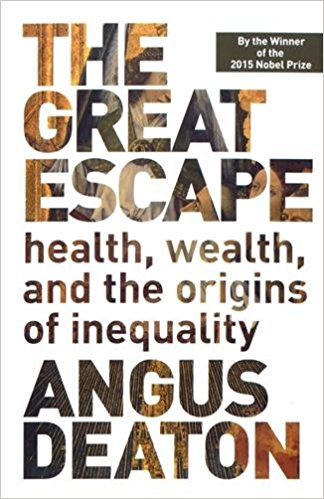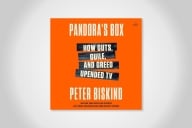You have /5 articles left.
Sign up for a free account or log in.
 The Great Escape: Health, Wealth, and the Origins of Inequality by Angus Deaton
The Great Escape: Health, Wealth, and the Origins of Inequality by Angus Deaton
Published in 2013.
It is easy to get depressed about our world. Trump is president? Enough said.
A good antidote to Trump incited malaise is to think big picture and long-term.
The Great Escape is the perfect book to remind ourselves that we are living in the very best time to be alive. That story of the past 200 hundred years, and particularly the last 30 or so years, has been one of remarkable progress. And despite all of our worrying about the current state of politics, and the growth of inequality, the future of the world is likely to be one of both better health and more wealth.
The Great Escape is a description of economic change on three time scales.
The first is the longer scale - the massive global changes in human life expectancy and well-being over the 19th and 20th centuries. It is far too easy to forget the material deprivations that our great grandparents navigated. Life expectancy in the U.S. was below 50 at the turn of the 21st century. This is not because there were no old people in 1900, but rather because so many children would die before age 5.
The second time scale for a Great Escape from early death and poverty was over the past 3 decades. This escape has been concentrated in the developing world, where today only about 1-in-7 persons lives on less than $1 dollar a day. In the early 1980s, before China and India joined the world economy, that proportion was 4-in-10. Since 1990 over a billion people have escaped poverty, again with the almost all these escapees living in either China or India. This is a remarkable story, and should be held up against any claims that “things are getting worse”.
The third time scale of the Great Escape is the future. Dealy is not shy in pointing out that while the last 40 years has been remarkable from a global scale, things have not gone quite so well in the U.S. The story of the United States since the early 1970s has been wage stagnation and growing inequality. Increased levels of stratification and economic uncertainty are real - but so is the fact that we have good reason to be optimistic about the future of our kids and their kids.
As Dealy points out, it would curious to conclude that the world is done making big advances in fighting illness. With all the worry about automation taking jobs, it is good to remember that new technologies have almost always increased living standards and improved working conditions, without leading to mass unemployment.
If The Great Escape falls down anywhere, it is in the concluding chapters on foreign aid. Dealy has concluded that foreign aid does more harm than good. He may have a case, but his argument would have been stronger with a more balanced presentation. It would be a shame if such an wonderful book gave intellectual ammunition for those who would like to disengage from making the world’s problems our problems.
The Great Escape was published in 2013. Sir Angus Deaton won the Nobel Prize in 2015. The audiobook came out in 2016, which meant that I did not read (listen) to the book until 2018. I’m glad I waited, as I needed this big picture book to remind me to stay positive about our future.
Do you have any big picture economic history books that you can recommend?
What are you reading?








